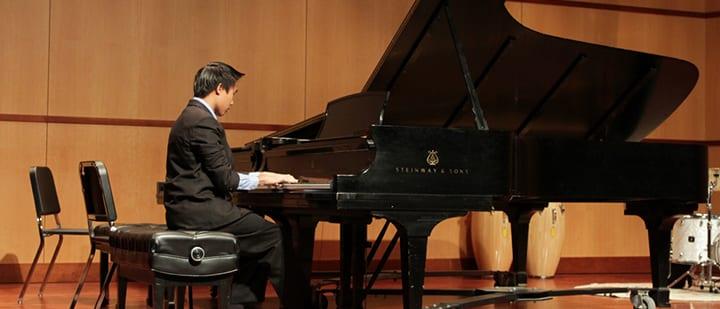 Most people think of piano recitals as strictly ways for young pianists to showcase their skills for proud family members. But adults can benefit from performances and recitals, as well! Learn more in this guest post by Seattle, WA teacher Erica L...
Most people think of piano recitals as strictly ways for young pianists to showcase their skills for proud family members. But adults can benefit from performances and recitals, as well! Learn more in this guest post by Seattle, WA teacher Erica L...
The lobby of the piano hall fills with camera flashes, nervous smiles, and small sweaty hands tightly clutching music books. Parents herd their children into the auditorium. However, when scanning the room, it’s clear very few adults are preparing themselves for a performance. One or two may pace nervously, squeeze their partner’s hand, or sit silently in their chairs remembering to breathe deeply. Seemingly these adults torture themselves for nothing. But rather, these students seize the opportunity to advance their skills and confidence.
Recitals secure skills that can only be rehearsed in lessons.
Most adult students instinctively hold themselves to a higher standard because “they know better.” As an adult, mistakes create a more significant negative impact on your self-image as a pianist. And as a result, rehearsing mistake recovery for adult students remains one of top priorities of a piano teacher. Piano lessons prepare you to make particular choices during adrenaline-prone moments. Piano recitals provide you with an opportunity to secure skills such as mistake recovery in these types of high-pressure moments.
Recitals encourage the steady development and growth of a student.
It’s inevitable that the start of January brings a tidal wave of new habits and skills. However, life gets busy, and by February any changes made have come to a halt. Participating in piano recitals provides a tangible deadline to work toward. The likelihood of completing a lesson book or learning a difficult song such as “Over the Rainbow” increases dramatically if you know a performance is on the calendar.
Recitals empower and build confidence.
Participation in recitals allows you to showcase new skills and growth. For example, say you worked on maintaining a steady tempo while playing a Clementi sonatina. However, by not performing the sonatina, you miss the opportunity to hear your practice time and effort validated by an appreciative audience. With that empowerment and success, confidence builds, and you begin to advance through harder skills and pieces.
Recitals teach vulnerability.
Performance requires vulnerability. With each note, you release hours of practice and effort into the hall. The audience will evaluate and listen to the performance. However, audiences listening to piano students never heckle or throw rotten fruit. They only encourage. So what better place can you find to practice making yourself vulnerable? You’ll also find that practicing vulnerability translates to other areas of life (e.g. relationships, workplace, self).
Recitals are more than recitals.
Piano recitals benefit adult students far more than realized. The recital develops security in certain performance skills such as mistake recovery. Additionally, it supports your growth as a student by forcing you to accomplish a goal. After a successful performance, the applause from an audience builds your confidence. You become more empowered and maintain a stronger belief in your capabilities. Finally, recitals provide an opportunity for you to practice vulnerability. Like many vocations, learning to play the piano offers many skills and benefits that translate beyond the music.
Erica L. teaches piano and music theory in Seattle, WA. She received her B.A. in Piano Performance from Seattle Pacific University. Learn more about Erica here!
Photo by Vlad & Marina Butsky
Suzy S.


